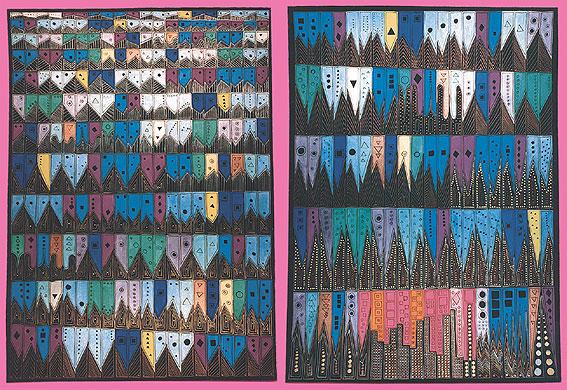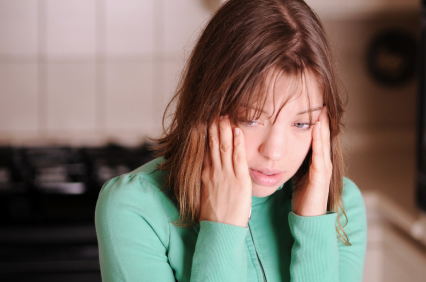
In this podcast, a story about obsession, creativity, and a strange symmetry between a biologist and a composer that revolves around one famously repetitive piece of music.
Anne Adams was a brilliant biologist. But when her son Alex was in a bad car accident, she decided to stay home to help him recover. And then, rather suddenly, she decided to quit science altogether and become a full-time artist. After that, her husband Robert Adams tells us, she just painted and painted and painted. First houses and buildings, then a series of paintings involving strawberries, and then … “Bolero.”
At some point, Anne became obsessed with Maurice Ravel’s famous composition and decided to put an elaborate visual rendition of the song to canvas. She called it “Unraveling Bolero.” But at the time, she had no idea that both she and Ravel would themselves unravel shortly after their experiences with this odd piece of music. Arbie Orenstein tells Jad what happened to Ravel after he wrote “Bolero,” and neurologist Bruce Miller andJonah Lehrer helps us understand how, for both Anne and Ravel, “Bolero” might have been the first symptom of a deadly disease.
ᔥRadiolab podcast
The psychological impact of the Olympics on athletes and fans revealed

Dr. Christian Jarrett
In an Olympic and Paralympics themed issue of
The Psychologist, which is published today (Thursday 28 June),
Dr Christian Jarrett looks at the effect competition can have on sporting performance and explains how athletes manage intense pressure.
He’ll also look at how psychology can shed light on some of the great Olympic rivalries and how fans are affected by the highs and lows of watching our national sporting heroes in action.
Dr Jarrett, a Chartered Psychologist and editor of the British Psychological Society’s Research Digest, says: “Legends will be born and dreams will die this summer as London becomes a crucible for the ultimate sporting competition. The pressure will be intense.
“I’ll be asking how the athletes will cope and whether the heat of competition can lift our sporting heroes to new heights or stifle their promise.”
ᔥBritish Psychological Society

© Getty Images
Social interactions during adolescence can affect health many years into adulthood, according to research published in the open access journal PLoS ONE. The study was led by Per E. Gustafsson at the Department of Public Health and Clinical Medicine,
Umeå University, Sweden.
The researchers from Umeå University and Stockholm University used data from a long-term study monitoring social relationships and health over 27 years, from age 16 to 43, for over 800 participants. They found that problematic peer relationships in adolescence, as measured through teachers’ assessments, were correlated with all components of metabolic syndrome, which is a cluster of metabolic and cardiovascular issues including obesity and high blood pressure, in middle-age.
Results showed a dose-response relationship between peer problems in adolescence and metabolic syndrome in middle-age, corresponding to 36% higher odds for the metabolic syndrome at age 43 for each SD higher peer problems score at age 16. The association remained significant after adjustment for health, health behaviors, school adjustment or family circumstances in adolescence, and for psychological distress, health behaviors or social circumstances in adulthood. In analyses stratified by sex, the results were significant only in women after adjustment for covariates.
The effect was particularly noticeable among females, with the most unpopular and introverted at 16 more than three times as likely to be in bad shape at 43.
The researchers said the results can’t be easily explained why the effect was stronger in females, but suggested it could be because men and women had “different life course pathways”.
Peer problems were significantly related to all individual components of the metabolic syndrome. These results suggest that unsuccessful adaption to the school peer group can have enduring consequences for metabolic health.
ᔥUmeå University

© iStockphoto
A new study that is published in the current issue of
Psychotherapy and Psychosomatics examines the role of specific forms of psychotherapy, cognitive therapy in anxious depression.
Compared to nonanxious depressed patients, anxious depressed patients respond less to pharmacotherapy, prompting consideration of alternate treatments. Based on the transdiagnostic principles of cognitive therapy (CT), a group of investigators predicted that anxious depressed patients would respond as well to CT as nonanxious depressed patients. Adults (n = 523) with recurrent major depressive disorder received 12–14 weeks of CT as part of the Continuation Phase Cognitive Therapy Relapse Prevention Trial. Anxious depressed patients (n=264; 50.4%) were compared to nonanxious depressed patients (n = 259; 49.6%) on demographic variables, initial severity, attrition, and rates and patterns of response and remission.
Anxious depressed patients presented with greater illness severity and had significantly lower response (55.3 vs. 68.3%) and remission rates (26.9 vs. 40.2%) based on clinician-administered measures. By contrast, smaller between-group differences for attrition, and for response (59.1 vs. 64.9%) and remission (41.7 vs. 48.7%) rates on self-report measures were not significant. Further, anxious depressed patients had greater speed of improvement on self-reported anxiety symptom severity and clinician-rated depressive and anxiety symptom severity measures. Consistent with prior reports, anxious depressed patients presented with greater severity and, following CT, had lower response and remission rates on clinician-administered scales. However, anxious depressed patients improved more rapidly and response and remission rates on self-report measures were not significantly different from nonanxious depressed patients. These findings suggest that anxious depressed patients may simply need additional time or more CT sessions to reach outcomes fully comparable to those of less anxious patients.
ᔥPsychotherapy and Psychosomatics
Full bibliographic information
Smits, J.A.J. ; Minhajuddin, A. ; Thase, M.E. ; Jarrett, R.B. Outcomes of Acute Phase Cognitive Therapy in Outpatients with Anxious versus Nonanxious Depression. Psychother Psychosom 2012;81:153-160




